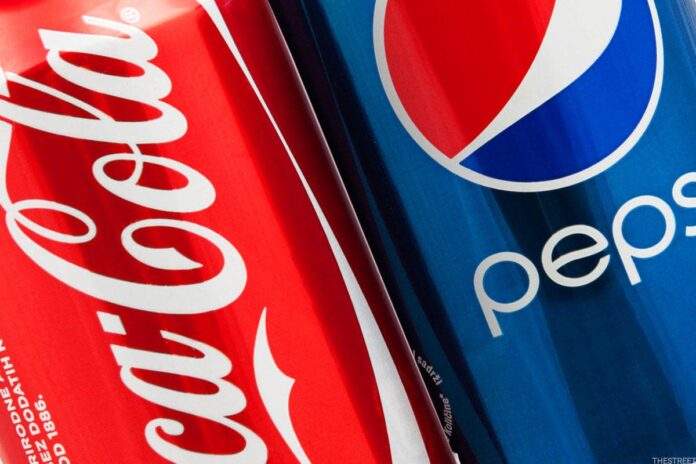Both PepsiCo and Coca-Cola have long and storied histories. Coca-Cola was founded in 1886 by John S. Pemberton in Atlanta, Georgia, while PepsiCo’s roots trace back to 1893 when Caleb Bradham created “Brad’s Drink,” which eventually became Pepsi. Over the years, both companies have weathered economic challenges, evolving consumer preferences, and international expansions, each shaping their strategies for corporate dominance.
The corporate dominance of PepsiCo and The Coca-Cola Company in the beverage industry is undeniable. With their pervasive global presence, iconic brands, and substantial financial resources, these corporate giants have shaped consumer preferences and market dynamics for decades. However, while their success is commendable from a business standpoint, it also raises concerns about its implications for society, competition, and public health. This following explores the multifaceted aspects of the corporate dominance of Pepsi and Coca-Cola and delves into its potential drawbacks.
Market Manipulation and Anti-competitive Practices
One of the significant issues arising from the corporate dominance of Pepsi and Coca-Cola is their capacity to manipulate the market. The enormous market share and extensive distribution networks of these companies can lead to exclusionary practices that hinder the growth of smaller competitors. Such practices may include aggressive pricing strategies, exclusive contracts with retailers, and tactics that limit access to shelf space for rival products. This dominance can stifle competition, limit consumer choice, and inhibit innovation within the beverage industry.
Impact on Public Health
The core products of Pepsi and Coca-Cola – sugary soft drinks – have come under increasing scrutiny due to their contribution to the global health crisis of obesity and diet-related diseases. The aggressive marketing of these beverages, often targeted at children and teenagers, has been associated with rising rates of obesity, diabetes, and dental problems. Critics argue that the corporate dominance of these companies enables them to downplay the health risks associated with their products while promoting excessive consumption. This raises ethical questions about the responsibility of corporations regarding public health concerns.
Environmental Concerns
The scale of production and distribution required to maintain the corporate dominance of Pepsi and Coca-Cola has significant environmental consequences. From sourcing raw materials to the production of single-use plastic bottles, their operations contribute to plastic waste, water depletion, and greenhouse gas emissions. Despite some sustainability initiatives, these companies must address the environmental impact of their activities more proactively and implement concrete measures to reduce their ecological footprint.
Cultural Homogenisation and Local Economies
PepsiCo and Coca-Cola’s global expansion has led to the homogenisation of beverage choices and cultural influence, potentially overshadowing local beverages and traditions. In some regions, the dominance of these multinational corporations has resulted in the decline of indigenous drinks and local businesses. Additionally, by utilising their significant financial resources, these companies can influence local policies and regulations, potentially undermining the autonomy of governments in developing nations.
Labour Practices and Supply Chain Ethics
Corporate dominance can give rise to concerns about labour practices and supply chain ethics. While both PepsiCo and Coca-Cola have made efforts to improve labour conditions in their supply chains, reports of exploitation and inadequate wages have emerged. The vast reach of these companies means they are responsible for vast networks of farmers, factory workers, and distributors worldwide. Ensuring fair wages, safe working conditions, and ethical treatment throughout the supply chain is a significant challenge that they must address effectively.
Burp! Pepsi Versus Coke by John Pilger
“Burp! Pepsi versus Coke” is a documentary film by John Pilger that explores the intense rivalry between two beverage giants, Pepsi and Coca-Cola. The film delves into the companies’ marketing strategies, their efforts to dominate the global soft drink market, and the impact of their corporate presence on different societies.
The documentary highlights how Pepsi and Coca-Cola aggressively target consumers through massive advertising campaigns, celebrity endorsements, and cultural associations. These companies have diversified their product portfolios to cater to various demographics, allowing them to maintain their market dominance even as consumer preferences change.
John Pilger also examines the negative aspects of their corporate dominance. The film discusses how their sugary soft drinks have been linked to health problems such as obesity, diabetes, and dental issues, raising concerns about public health. Additionally, their vast global operations have environmental consequences, such as plastic waste and carbon emissions.
Furthermore, the documentary touches on the companies’ exploitation of labour and resources in developing nations, impacting local economies and cultural traditions. It sheds light on instances where these corporations influence governments and policies in their favour.
Overall, “Burp! Pepsi versus Coke” presents a critical analysis of the corporate rivalry between Pepsi and Coca-Cola, questioning the ethical implications of their business practices and their influence on global society, health, and the environment.
Join us in helping to bring reality and decency back by SUBSCRIBING to our Youtube channel: https://www.youtube.com/channel/UCQ1Ll1ylCg8U19AhNl-NoTg and SUPPORTING US where you can: Award Winning Independent Citizen Media Needs Your Help. PLEASE SUPPORT US FOR JUST £2 A MONTH https://dorseteye.com/donate/







